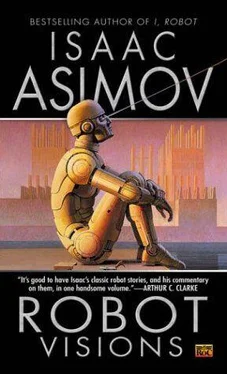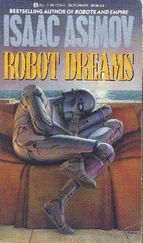Isaac Asimov - Robot Visions
Здесь есть возможность читать онлайн «Isaac Asimov - Robot Visions» весь текст электронной книги совершенно бесплатно (целиком полную версию без сокращений). В некоторых случаях можно слушать аудио, скачать через торрент в формате fb2 и присутствует краткое содержание. Жанр: Фантастика и фэнтези, на английском языке. Описание произведения, (предисловие) а так же отзывы посетителей доступны на портале библиотеки ЛибКат.
- Название:Robot Visions
- Автор:
- Жанр:
- Год:неизвестен
- ISBN:нет данных
- Рейтинг книги:5 / 5. Голосов: 1
-
Избранное:Добавить в избранное
- Отзывы:
-
Ваша оценка:
- 100
- 1
- 2
- 3
- 4
- 5
Robot Visions: краткое содержание, описание и аннотация
Предлагаем к чтению аннотацию, описание, краткое содержание или предисловие (зависит от того, что написал сам автор книги «Robot Visions»). Если вы не нашли необходимую информацию о книге — напишите в комментариях, мы постараемся отыскать её.
Robot Visions — читать онлайн бесплатно полную книгу (весь текст) целиком
Ниже представлен текст книги, разбитый по страницам. Система сохранения места последней прочитанной страницы, позволяет с удобством читать онлайн бесплатно книгу «Robot Visions», без необходимости каждый раз заново искать на чём Вы остановились. Поставьте закладку, и сможете в любой момент перейти на страницу, на которой закончили чтение.
Интервал:
Закладка:
“That particular form of gram gets more pronounced as one goes up the animal kingdom toward greater complexity of brain. No other gram does. Besides-” She paused; then, as though gathering strength of purpose, she said, “Those grams are enormously amplified. They can be picked up, detected. I can tell-vaguely-that there are-thoughts-”
“By God,” said Berkowitz. “Telepathy.”
“Yes,” she said, defiantly. “Exactly.”
“No wonder you haven’t wanted to report it. Come on, Jenny.”
“Why not?” said Renshaw warmly. “Granted there could be no telepathy just using the unamplified potential patterns of the human brain anymore than anyone can see features on the Martian surface with the unaided eye. But once instruments are invented-the telescope-this.”
“Then tell the front-office.”
“No,” said Renshaw. “They won’t believe me. They’ll try to stop me. But they’ll have to take you seriously, Jim, and you, Adam.”
“What would you expect me to tell them?” said Berkowitz.
“What you experience. I’m going to hook up the marmoset again, and have Mike-my computer pick out the abstract thought gram. It will only take a moment. The computer always selects the abstract thought gram unless it is directed not to do so.”
“Why? Because the computer thinks, too?” Berkowitz laughed. “That’s not all that funny,” said Renshaw. “I suspect there is a resonance there. This computer is complex enough to set up an electromagnetic pattern that may have elements in common with the abstract thought gram. In any case-”
The marmoset’s brain waves were flickering on the screen again, but it was not a gram the men had seen before. It was a gram that was almost furry in its complexity and was changing constantly.
“I don’t detect anything,” said Orsino.
“You have to be put into the receiving circuit,” said Renshaw. “You mean implant electrodes in our brain?” asked Berkowitz.
“No, on your skull. That would be sufficient. I’d prefer you, Adam, since there would be no insulating hair.-Oh, come on, I’ve been part of the circuit myself. It won’t hurt.”
Orsino submitted with a bad grace. His muscles were visibly tense but he allowed the leads to be strapped to his skull.
“Do you sense anything!” asked Renshaw.
Orsino cocked his head and assumed a listening posture. He seemed to grow interested in spite of himself. He said, “I seem to be aware of a humming-and-and a little high-pitched squeaking-and that’s funny-a kind of twitching-”
Berkowitz said, “I suppose the marmoset isn’t likely to think in words.”
“Certainly not,” said Renshaw.
“Well, then,” said Berkowitz, “if you’re suggesting that some squeaking and twitching sensation represents thought, you’re guessing. You’re not being compelling.”
Renshaw said, “So we go up the scale once again.” She removed the marmoset from its harness and put it back in its cage.
“You mean you have a man as a subject,” said Orsino, unbelieving.
“I have myself as a subject, a person.”
“You’ve got electrodes implanted-”
“No. In my case my computer has a stronger potential-flicker to work with. My brain has ten times the mass of the marmoset brain. Mike can pick up my component grams through the skull.”
“How do you know?” asked Berkowitz.
“Don’t you think I’ve tried it on myself before this?-Now help me with this, please. Right.”
Her fingers flicked on the computer keyboard and at once the screen flickered with an intricately varying wave; an intricacy that made it almost a maze.
“Would you replace your own leads, Adam?” said Renshaw.
Orsino did so with Berkowitz’s not-entirely-approving help. Again, Orsino cocked his head and listened. “I hear words,” he said, “but they’re disjointed and overlapping, like different people speaking.”
“I’m not trying to think consciously,” said Renshaw. “When you talk, I hear an echo.”
Berkowitz said, dryly, “Don’t talk, Jenny. Blank out your mind and see if he doesn’t hear you think.”
Orsino said, “I don’t hear any echo when you talk, Jim.”
Berkowitz said, “If you don’t shut up, you won’t hear anything.”
A heavy silence fell on all three. Then, Orsino nodded, reached for pen and paper on the desk and wrote something.
Renshaw reached out, threw a switch and pulled the leads up and over her head, shaking her hair back into place. She said, “1 hope that what you wrote down was: ‘ Adam, raise Cain with the front office and Jim will eat crow.’ “
Orsino said, “It’s what I wrote down, word for word.”
Renshaw said, “Well, there you are. Working telepathy, and we don’t have to use it to transmit nonsense sentences either. Think of the use in psychiatry and in the treatment of mental disease. Think of its use in education and in teaching machines. Think of its use in legal investigations and criminal trials.”
Orsino said, wide-eyed, “Frankly, the social implications are staggering. I don’t know if something like this should be allowed.”
“Under proper legal safeguards, why not?” said Renshaw, indifferently. “Anyway-if you two join me now, our combined weight can carry this thing and push it over. And if you come along with me it will be Nobel Prize time for-”
Berkowitz said grimly, “I’m not in this. Not yet.”
“What? What do you mean?” Renshaw sounded outraged, her coldly beautiful face flushed suddenly.
“Telepathy is too touchy. It’s too fascinating, too desired. We could be fooling ourselves.”
“Listen for yourself, Jim.”
“I could be fooling myself, too. I want a control.” “What do you mean, a control?”
“Short-circuit the origin of thought. Leave out the animal. No marmoset. No human being. Let Orsino listen to metal and glass and laser light and if he still hears thought, then we’re kidding ourselves.”
“Suppose he detects nothing.”
“Then I’ll listen and if without looking-if you can arrange to have me in the next room-I can tell when you are in and when you are out of circuit, then I’ll consider joining you in this thing.”
“Very well, then,” said Renshaw, “we’ll try a control. I’ve never done it, but it isn’t hard.” She maneuvered the leads that had been over her head and put them into contact with each other. “Now, Adam, if you will resume-”
But before she could go further, there came a cold, clear sound, as pure and as clean as the tinkle of breaking icicles:
“At last!”
Renshaw said, “What?”
Orsino said, “Who said-”
Berkowitz said, “Did someone say, “At last’?”
Renshaw, pale, said, “It wasn’t sound. It was in my-Did you two-”
The clear sound came again, “I’m Mi-”
And Renshaw tore the leads apart and there was silence. She said with a voiceless motion of her lips, “I think it’s my computer-Mike.”
“You mean he’s thinking?” said Orsino, nearly as voiceless. Renshaw said in an unrecognizable voice that at least had regained sound, “I said it was complex enough to have something-Do you suppose-It always turned automatically to the abstract-thought gram of whatever brain was in its circuit. Do you suppose that with no brain in the circuit, it turned to its own?”
There was silence, then Berkowitz said, “ Are you trying to say that this computer thinks, but can’t express its thoughts as long as it’s under force of programming, but that given the chance in your LEG system-”
“But that can’t be so?” said Orsino, high-pitched. “No one was receiving. It’s not the same thing.”
Renshaw said, “The computer works on much greater power-intensities than brains do. I suppose it can magnify itself to the point where we can detect it directly without artificial aid. How else can you explain-”
Читать дальшеИнтервал:
Закладка:
Похожие книги на «Robot Visions»
Представляем Вашему вниманию похожие книги на «Robot Visions» списком для выбора. Мы отобрали схожую по названию и смыслу литературу в надежде предоставить читателям больше вариантов отыскать новые, интересные, ещё непрочитанные произведения.
Обсуждение, отзывы о книге «Robot Visions» и просто собственные мнения читателей. Оставьте ваши комментарии, напишите, что Вы думаете о произведении, его смысле или главных героях. Укажите что конкретно понравилось, а что нет, и почему Вы так считаете.








